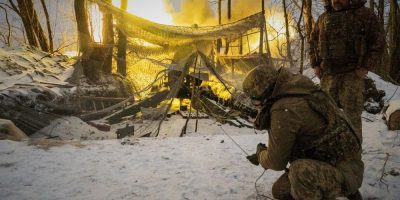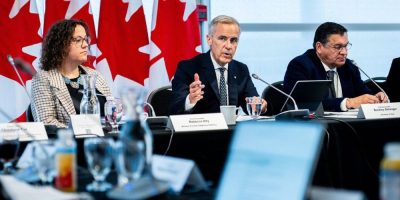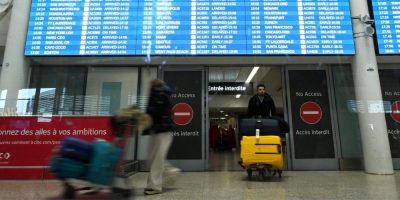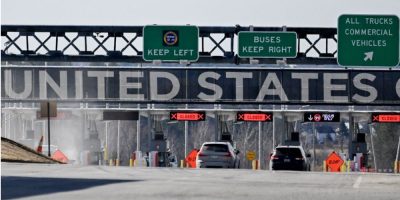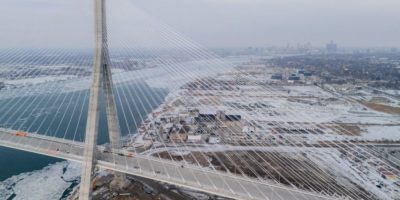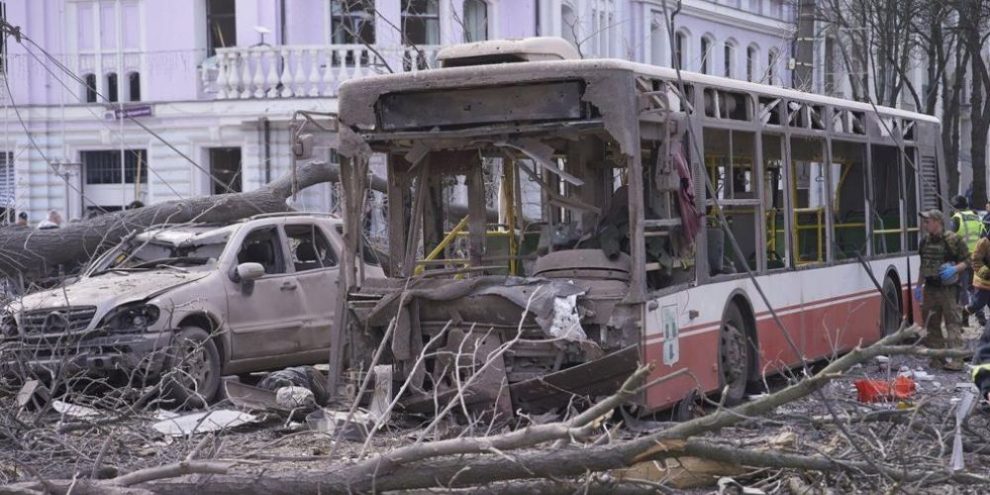
Ottawa is watching closely as U.S. President Donald Trump attempts to play peacemaker in the war in Ukraine.
Canada has volunteered to play a role in helping maintain peace in Ukraine, if a ceasefire deal can be reached between Russian President Vladimir Putin and Ukrainian President Volodymyr Zelenskyy to end the fighting that Moscow started in 2014.
The way the war ends could reverberate for decades.
"It has an impact and ramifications on global security, on peace around the world," said Marcus Kolga, a senior fellow with the Macdonald-Laurier Institute.
Barrie's News Delivered To Your Inbox
By submitting this form, you are consenting to receive marketing emails from: Central Ontario Broadcasting, 431 Huronia Rd, Barrie, Ontario, CA, https://www.cobroadcasting.com. You can revoke your consent to receive emails at any time by using the SafeUnsubscribe® link, found at the bottom of every email. Emails are serviced by Constant Contact
Here's a look at what's at stake for Canada, and how Ottawa might be called on to help.
What's going on in the talks?
On Aug. 15, U.S. President Donald Trump welcomed Putin to a high-profile summit in Alaska, ending years of western isolation for Russia and its leader. Several days later Trump also hosted Ukrainian President Volodymyr Zelenskyy and European leaders at the White House.
Ukraine said it needs "security guarantees" from other countries that can ensure Russia won’t mount another invasion, while Moscow has called for Ukraine to be barred from membership in groups like NATO or the European Union.
Canada has been part of talks for more than two years on how to help secure any sort of peace deal in Ukraine. Those talks morphed last fall into the Coalition of the Willing, a group of nations who have offered to help fund or staff a peacekeeping force on Ukrainian territory.
In addition to Canada the group includes most European nations as well as Japan and Australia. Canada's top soldier has also been part of NATO talks to co-ordinate possible military contributions.
Trump has said the U.S. won't send troops into Ukraine, but might provide air support to maintain peace.
How did this conflict start?
Russia invaded Ukraine in 2014, annexing Crimea and fighting for other territories for eight years, before launching the February 2022 full-scale invasion of Ukraine.
Trump has erroneously suggested Ukraine started the conflict.
Ukraine says its 2014 democratic uprising against a Russia-backed, autocratic president threatened Moscow's control over the country, as Kyiv inched closer toward the European Union. Kyiv says it wants to chart a democratic, western path as a multi-ethnic country, in contrast to Moscow's nationalist narrative that leans heavily on traditional Orthodox viewpoints.
Ukrainians say they've been victims of Russian imperialism over centuries, citing repeated suppression of Ukrainian language and identity, the 1932 Holodomor famine, and evidence of Russia soldiers torturing and mutilating Ukrainians during the current war.
Ukraine gave up its nuclear weapons in 1994 on the agreement that Moscow, Washington and London would guarantee Ukraine's security.
Russia says it is trying to prevent a Western invasion and protect speakers of the Russian language — but these claims don't align with reality.
Moscow claims Ukraine is an American puppet state that is run by a Nazi regime, despite the current president and former prime minister being Jewish.
Russia has taken examples of real and imagined examples of discrimination against minorities in Ukraine and restrictions on the Russian language, as grounds to say Kyiv has a terrorist government that must be toppled with territories absorbed into Russia.
Moscow claims NATO's expansion to former Soviet countries bordering Russia shows the West trying to destabilize Russia. The Kremlin has openly mulled reconstituting the Soviet Union, which was succeeded by Russia and 14 sovereign countries.
The countries who chose to join NATO say they need western backing to hold back Moscow after its invasions into Georgia and Ukraine and cyberattacks on Estonia.
How does our support stack up against others?
The Kiel Institute, which measures global contributions to Ukraine, pegs Canada as the fifth most generous in raw dollars, and 11th in rank based on gross domestic product.
The top donor in raw dollars is the U.S., followed by Germany, the U.K. and Japan. Those giving the highest share of support proportionate to economic size include the Netherlands, most Scandinavian countries and the Baltics.
The tracker says Canada has committed more than $19.7 billion in support for Ukraine, while Ottawa tallies this at $22 billion, including military, humanitarian and financial aid. That is more per capita and by dollar than France and Italy.
A large chunk of Ottawa's support is loans, which underwrite the Ukrainian government so it is able to finance operations and take on debt.
Canada has an outsized role in humanitarian initiatives, such as work to resettle Ukrainian children abducted by Russia, maintain maternal health services and the detection and removal of landmines.
Will we send troops to Ukraine? What could we be called on to do to help secure a ceasefire?
Prime Minister Mark Carney would not specify Friday how Canada could help, but noted Ukraine will needs support on land, air and sea.
"It's a fluid situation; it's a delicate situation, so I'm not going to describe specifics," he told reporters.
"Any security guarantee starts with a robust Ukrainian army. And that means weapons, that means training, that means viability."
Carleton University professor Stephen Saideman said Canada is limited in how much military support it could offer. "We don't really have a whole lot on the shelves to send them," he said.
It's not clear if Canadian soldiers will be on the ground in Ukraine, given that there is no ceasefire agreed upon, and Putin says he won't accept NATO troops being stationed in Ukraine.
Even if it were possible, Canada would need to redeploy hundreds of its troops from an ongoing NATO mission in Latvia, with troops stationed near the Russian border to deter Moscow from invading.
"If you want to have a real combat-capable force, you'd have to basically take what's in Latvia and move it to Ukraine, and the Latvians would not be that thrilled about that," Saideman said.
Canada has led a training mission for Ukrainian troops since 2015, and could likely continue this training for both Ukraine and any countries sending peacekeepers.
"If there's a ceasefire, then we can train them in Ukraine. So that would be a couple hundred troops doing that," Saideman said, adding that some special-operations forces might also help Ukraine.
He said Canada does not have much air-patrol capacity or ships that would help secure the Black Sea or skies over Ukraine.
Kolga said Ottawa could also ramp up its financial efforts against Russia, such as beefing up efforts to forfeit Russian holdings in foreign banks to finance Ukraine's war effort, or sanctioning states supporting Russia's war economy.
Why is it in our interest to help Ukraine?
Kolga said there is a real threat for Canada's Arctic if Putin is given the message that it can win territory and respect for annexing land.
"He will rearm himself. He will reconstitute his forces — which are significant already," he said. "He could try this again elsewhere. All of the signals are there."
Kolga notes Russia has refurbished or newly built dozens of military bases in the Arctic. Moscow has made "maximalist claims" on Arctic waters that overlap with areas claimed by Ottawa.
"We can put the brakes on all this by ensuring that Ukraine wins."
Kolga argues western countries should have scaled up their arms for Ukraine with fewer limits earlier in the conflict, to defeat Russia instead of providing "drips and drabs" that prolonged the war.
"We wouldn't be in the predicament that we are today," he said.
Western countries expressed fear of provoking direct confrontation with Russia, which has nuclear weapons. Russia has since reoriented its economy to a focus on weaponry and trade with countries that haven't sanctioned Moscow such as China, India and Brazil.
Victory for Ukraine "will act as a severe blow" to Putin and Russia's "neo-imperialism" in the Arctic and Russia, Kolga said.
This report by The Canadian Press was first published Aug. 23, 2025.
